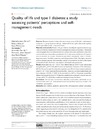Please use this identifier to cite or link to this item:
https://accedacris.ulpgc.es/jspui/handle/10553/47595
| Title: | Quality of life and type 1 diabetes: a study assessing patients' perceptions and self-management needs | Authors: | Alvarado-Martel, Dácil Velasco, Rebeca Sánchez-Hernández, Rosa M. Carrillo, Armando Novoa, Francisco J. Wägner, Ana María |
UNESCO Clasification: | 32 Ciencias médicas 320502 Endocrinología 3212 Salud pública |
Keywords: | Type 1 Diabetes Qualitative Quality of Life Self-Management Patients' Perceptions |
Issue Date: | 2015 | Journal: | Patient Preference and Adherence | Abstract: | Purpose: The main objective of this study was to assess quality of life (QoL) and treatment satisfaction in a group of patients with type 1 diabetes (T1D) and explore their needs regarding and their perception of QoL living with diabetes.Materials and methods: Patients with type 1 diabetes attending the outpatient endocrinology clinics of a reference hospital were invited to participate in a cross-sectional study. Clinical and sociodemographic data were obtained (interview and clinical records), and diabetes-related QoL was assessed using a standardized questionnaire. In 67 participants, satisfaction with treatment was also assessed, and an open interview was performed, assessing the impact of diabetes, long-term worries, flexibility, restrictions, and self-perception of QoL. Descriptive statistical analysis, bivariate analysis, and multivariate analysis were performed in order to find factors associated with QoL. Interviews were analyzed and summarized questionwise.Results: Mean patient age was 31.4 +/- 11.6 years, diabetes duration 14.2 +/- 9.3 years, and glycated hemoglobin (HbA(1c)) 8.5%+/- 1.9% (69 +/- 20.8 mmol/mol International Federation of Clinical Chemistry [IFCC]). The questionnaires showed good average QoL scores (94.6+22.9) and treatment satisfaction scores (25.7 +/- 6.7). QoL worsened with increasing HbA(1c), female sex, severity of complications, and lower education (r(2)=0.283, P<0.005). In the open interview, 68.5% of the patients reported that diabetes had changed their lives, 83.5% identified complications as their most important long-term concern, and 59.7% said that they needed more training to manage the disease.Conclusion: Poor glycemic control, lower education, complications, and female sex are associated with worse QoL. Semi-structured interviews identified aspects not included in the standardized questionnaires. | URI: | https://accedacris.ulpgc.es/handle/10553/47595 | ISSN: | 1177-889X | DOI: | 10.2147/PPA.S87310 | Source: | Patient Preference and Adherence [EISSN 1177-889X], v. 9, p. 1315-1323, (Septiembre 2015) |
| Appears in Collections: | Artículos |
SCOPUSTM
Citations
40
checked on Jun 8, 2025
WEB OF SCIENCETM
Citations
40
checked on Feb 8, 2026
Page view(s)
85
checked on Jan 10, 2026
Download(s)
124
checked on Jan 10, 2026
Google ScholarTM
Check
Altmetric
Share
Export metadata
Items in accedaCRIS are protected by copyright, with all rights reserved, unless otherwise indicated.
